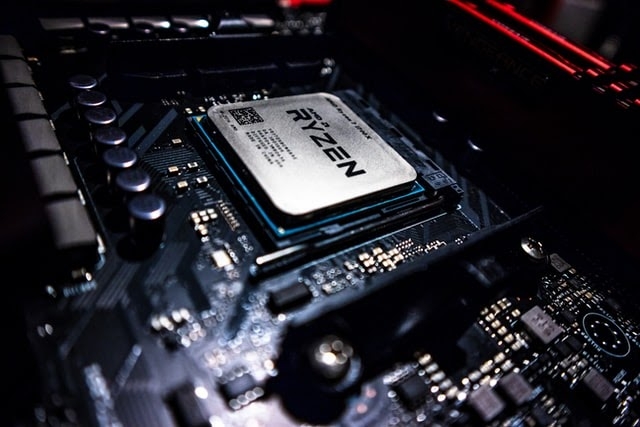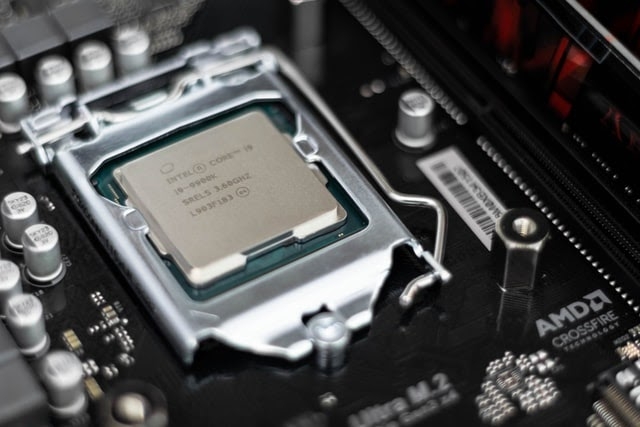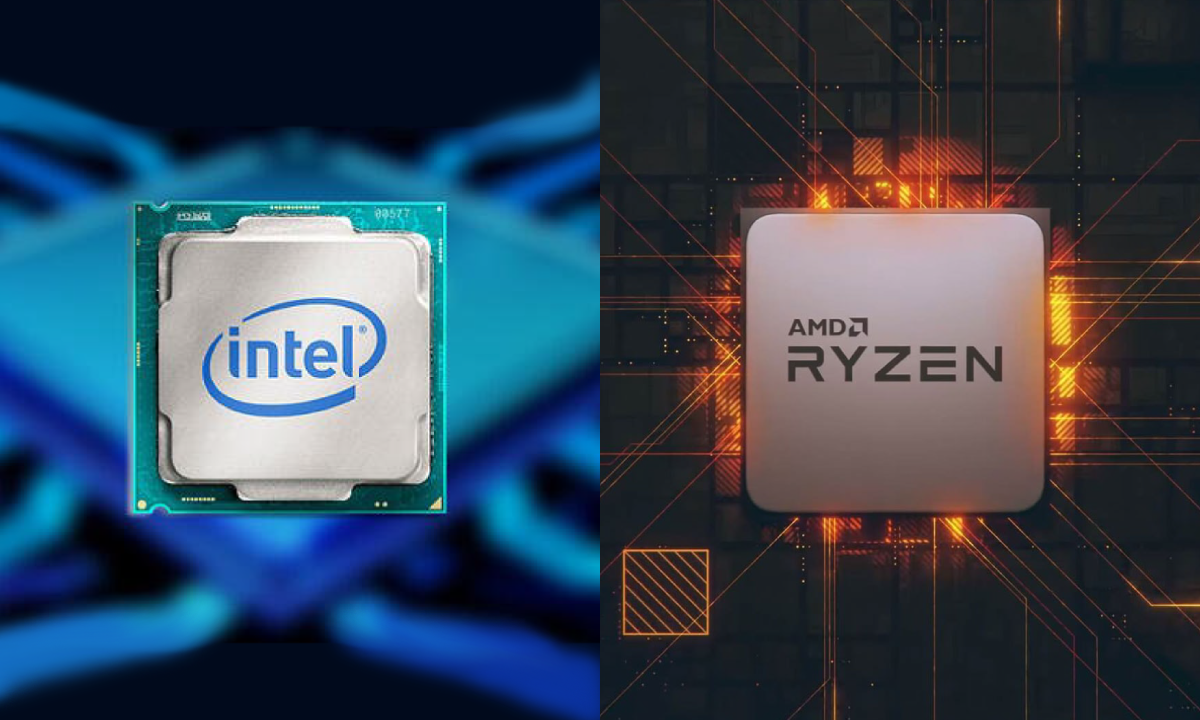The CPU Battle: Intel vs AMD
When it comes to the battle of CPUs, there is no fiercer competition than Intel vs AMD. In fact, aside from these two companies, there is virtually no other processor that comes close to competing in the processor ring.
While there are plenty of other brands out there that provide quality CPUs, most people immediately think of either Intel or AMD, and their industry partnerships aim to keep it that way. In simple terms of brand recognition, these two come out on top and make up the lion’s share of the market.
In this article we take a look at both and address whether there is a clear, discernible winner in the Intel vs AMD CPU war. We will tackle this topic by defining our “arenas” for battle, dissecting them each respectively, and then speculating on the future of each competitor.
Is Intel or AMD Better?

AMD Ryzen CPU, Image Source
If you are looking for the best CPUs for gaming, video editing, or machine learning, then it really comes down to a battle of Intel vs AMD. No third parties come close to the popularity of these two giants for gamers, video editors, and AI practitioners.
Due to this, it is difficult to find and engage with unbiased opinions of these two CPU powerhouses. In the recent past, the victor was obvious: AMD. In fact, it was nearly always a landslide victory for AMD for the vast majority of users.
In retrospect, though, this is an underdog story considering AMD nearly went bankrupt just a few years ago. Before this, Intel dominated the CPU industry as the standalone chip to use across the board. Which means that Intel is due for its own comeback soon as it looks to the future of AI and how it can compete against AMD. And, Intel may take back the crown with their new Alder Lake chips..
Rather than compare Intel vs AMD in broad specifications, this article will focus on specific industries and use cases. We will be covering three major industries where we can truly address the question, “Is Intel or AMD better?” We are going to take a look at AMD vs Intel for gaming, Intel vs AMD video editing, and Intel vs AMD for machine learning.
AMD vs Intel For Gaming
When it comes to AMD vs Intel for gaming one must consider price and performance, as well as the gap between the two.

Gaming computer, Image Source
When it comes to pricing, AMD comes out on top for anything in the middle and high end of their chipsets, not necessarily a prize you want to win. However, Intel's gaming performance isn't bad either. Intel might actually squeak out a small victory in terms of sheer amount of power that can be squeezed out, with the right set up, when compared to AMD. If you are aiming for overclocking, Intel has the edge here, but it does so at a cost of energy consumption which can affect battery life of laptops and overall energy cost for desktops.
Something to consider, though, the performance gap between Intel and AMD's competitively-priced CPUs isn't worth paying a significant premium for. At the top of the Intel vs AMD models, moderate variations in gaming performance are difficult, at best, to notice. So, unless you have money to burn and want minor performance improvements, you may want to just stick with AMD for now.
For example, to truly notice the performance advantage, you'll need an insanely high-performing GPU and a high-end gaming display with 1080p resolution. If you go higher than 1080p, then it will shift the power to your GPU and the need for a high-end CPU drops off. This means there is a specific window in which your CPU can make or break your gaming PC build. Otherwise, it is more worthwhile to invest in a top-tier GPU instead.
In the end, this particular battle of AMD vs Intel for gaming ends in a draw. AMD remains powerful and affordable. Intel has upped their products to match, and even just barely surpass AMD, in terms of affordability and raw power.
Our suggestions for Intel vs AMD CPUs for gaming: the AMD Ryzen 9 3900X and the Intel Core i9.

Intel Core i9 CPU, Image Source
Both of these are considered mid-range and similar in price, but with the Intel Core i9 outperforming AMD in specific cases. At a higher price and performance range, the AMD Ryzen 9 5950X is possibly one of the best on the market.
Intel vs AMD Video Editing
As video-media companies such as TikTok and YouTube gain popularity, the popularity of video editing is rising with them. With better and simpler editing software being created to compensate for this increase in popularity, video editing is a new "arena" in the Intel vs AMD wars.
For video editing there is not only a demand for highly skilled workers, but also a need for powerful PC workstations. Video editing, in particular, places a high demand on the CPU, being one of the most common processor-intensive tasks. A faster CPU can help cut down on rendering time and increase workflow for the creative process of carefully chopping, slicing, and splicing videos.

Video editing, Image Source
When it comes to the battle of Intel vs AMD video editing CPUs, it really comes down to the fastest rendering, the most processing power, and best performance-to-affordability ratio. Both companies offer solid performers and you will need to just balance price vs. minor upticks in performance when deciding on what to go with.
We suggest the AMD Ryzen 9 3900X and the Intel Core i9. As mentioned with the AMD vs Intel for gaming section, at mid-range the Intel Core i9 slightly outclasses the AMD Ryzen 9 3900X, making it our definitive choice for video editing. Although, the AMD Ryzen 9 5950X is always a great choice if you are able to pay the higher price.
Intel vs AMD for Machine Learning
When it comes to Intel vs AMD for machine learning, we have written about the best CPUs for machine learning already. We encourage you to read that article for a more in-depth breakdown of this particular topic for all types of CPUs.
For this article, though, we will discuss the intricacies between Intel and AMD.

Machine learning with small AI robot, Image Source
In the case of CPUs for machine learning, Intel and AMD have always been the dueling leaders. While most debates are centered on AMD vs Intel for gaming, not as much has been explored in how they perform in the arena of machine learning and AI applications.
Machine learning workstations require a lot of bandwidth, so one of the most important considerations when selecting a CPU is the amount of PCIe lanes available. Your GPU will take up the majority of the PCIe lanes on your CPU with each GPU requiring 16 PCIe lanes.
GPUs handle a majority of the heavy lifting in machine learning workloads. This means you will want a CPU that can handle at least two GPUs. So, right away, we know this will be a major requirement when deciding between Intel and AMD.
Right away, price is going to be a negligible consideration when it comes to Intel vs AMD because we are going to be looking at extremely high-end, non-consumer grade CPUs. The CPUs we will need to even consider for machine learning will have upwards of 128 PCIe lanes.
So, aside from the number of PCIe lanes, other considerations include clock speed and thread count. Clock speed determines how quickly your CPU can process, store, and retrieve information. Thread count refers to the number of pathways available for your CPU to divide up processes to increase processing speed and power.
Intel is your best choice for a higher frequency clock speed, and AMD is your best hope for a greater thread count.
When it comes right down to it, these factors are only a few worth considering, but they are possibly more important to machine learning directly. Therefore, they are the primary factors we look at when considering Intel vs AMD for machine learning.
Our suggestion this time around is: the AMD Threadripper Pro hands down as the absolute best CPU for machine learning (which also makes it difficult to find with today's supply chain issues, so if you see it in stock make sure to grab it before id disappears again).
However, the price is the highest of any CPU on the market. If price is a major consideration for you, then we recommend starting out with the Intel Core i9 or AMD Ryzen 9 3900X.
For machine learning, AMD outclasses Intel at the highest ranges, but also gives Intel a run for its money at the mid-range, too. In the matchup of Intel vs AMD for machine learning, AMD wins.
The Future of the Intel and AMD CPU Battle
If you have been following along with this article, the choice is generally a stalemate with each generation of processors looking to upstage its competition. However, there is currently a slight advantage to Intel CPUs. The Intel Core i9 is a great piece of equipment that plants itself squarely at the cutting edge of technology without jacking up the price. That said, AMD is still a major power player if money is no object.
As we look to the future of Intel vs AMD, there has been a shakeup in the hierarchy. Within the last few years, AMD shook the computing world to its core by suddenly becoming one of, if not the, greatest processors creator on the market as it pushed its Ryzen line of chips. In response, Intel made some moves of their own just this year to innovate and bring Intel back to the forefront of technology.
Intel already has AMD beat in the price department. Intel CPUs are incredibly powerful for, sometimes, a fraction of the cost. AMD has some of the most high-quality, high-powered CPUs on the market that also don't eat up as much energy as Intel, but you pay a premium for them. However, you can also factor in the energy cost savings over time by using an AMD CPU vs the slightly cheaper upfront cost of Intel, to see if AMD is the overall winner here.
It is difficult to say where the Intel vs AMD wars will take us next, but it is a safe bet that the competition between the two will remain fierce. Intel has plans to release a new CPU that we are sure will cause AMD to react and create something to compete with Intel. Chances are, AMD will rise to the occasion, especially with the AMD Threadripper PRO being as utterly insane in speed and power as it is. However, Intel still has potential to outpace and outperform their rivals so we wait on the edge of our seat for the next chapter in the battle for dominance in the CPU industry.
Is Intel or AMD Better? Want to See More Resources About Our CPUs?
Currently we think AMD has some of the best processors available (if you can find them!), but they also tend to cost a bit more. Do you agree with our assessment? Let us know what you think in the comments below!
If you need help in choosing a CPU that is right for your own use case, feel free to contact us and we can help get you pointed in the right direction today.
You can also find other articles and comparisons elsewhere on the SabrePC blog. Keep a lookout for more helpful articles on the way soon!


